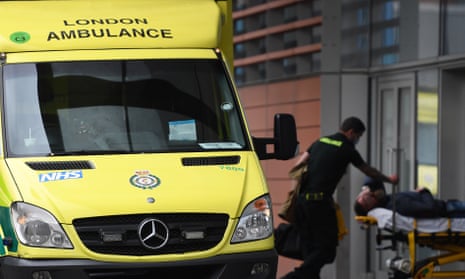Ambulance workers could coordinate strike action with other NHS workers to send a clear message to the government to invest in the health service, the UK’s biggest trade union, Unison, has said.
About 20,000 health workers in England, including non-medical NHS staff, will take part in the first wave of strikes before Christmas. They could be joined by more occupational groups as many are expected to return ballot papers in the coming days.
The Royal College of Nursing (RCN) announced strikes on 15 and 20 December in its pay dispute with the government. Asked if ambulance workers would coordinate industrial action with nurses, Sara Gorton, the head of health at Unison, said: “We have a good relationship with all NHS trade unions. We will be talking about coordinating action with all who get industrial action mandates.
“We’re expecting other groups of healthcare workers to return their ballot results in the coming days or weeks, so this could see different occupational groups join over the course of the winter.
“The government needs to stop pretending they have engaged with this subject. Seven million of us are waiting for NHS treatment and it’s going to get bigger.”
The health secretary, Steve Barclay, said pay demands were “not affordable” and the strikes were “in nobody’s best interests as we approach a challenging winter”.
“Our economic circumstances mean unions’ demands are not affordable, each additional 1% pay rise for all staff on the Agenda for Change contract would cost around £700m a year.
“We have prioritised the NHS with record funding and accepted the independent pay review body recommendations in full to give over 1 million NHS workers a pay rise of at least £1,400 this year, with those on the lowest salaries receiving an increase of up to 9.3%. This is on top of 3% last year when public sector pay was frozen and wider government support with the cost of living.”
At least 80,000 healthcare workers voted in support of strike action out of the 280,000 across England who were balloted, Unison says. Despite a turnout of 35%, the union believes workers will be supported in the strike action, and that the public backs calls for NHS staff to receive better pay.
Gorton said: “About 80,000 people said they were prepared in the middle of the worst cost of living crisis, they are prepared to go without pay to call to government attention the dire state of pay. Things will get worse as we go through to winter.”
after newsletter promotion
Unison’s health committee will discuss on Wednesday what the strikes will look like, as they will need to meet “stringent” legal requirements if they are to be coordinated with other groups.
Saffron Cordery, the interim chief executive of NHS Providers, welcomed calling on support from the army during industrial action.
“This is something that has been raised over the past couple of days and I think it will be incredibly welcome for the army to play a role,” she told BBC Radio 4’s Today programme.
“I think it is probably clear that will be a role at the margins. For example, the army helped out during the pandemic but it was on issues such as helping with the vaccination drive … We will welcome their support but it will not play a central role in keeping the ambulance service going.”
